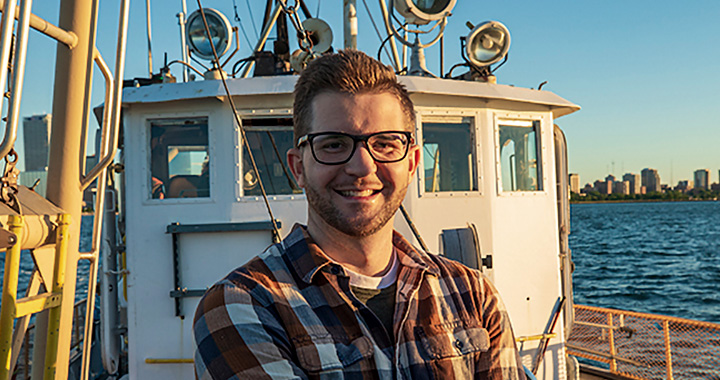When he was a college freshman at UW-Parkside, Ian Nebendahl, a graduate student from Naperville, Illinois, thought he would end up majoring in business. A class called Great Lakes Water Resources changed his mind and he realized he wanted to pursue a career in the sciences instead.
After he graduated with a bachelor’s in geosciences, Nebendahl began looking at graduate school. “I chose UWM and their freshwater sciences school because it was a centralized focus of what I wanted to get into,” he says. “Plus, I love Milwaukee.”
UWM’s School of Freshwater Sciences is the only one of its kind in North America, and offers PhD and master’s programs in freshwater sciences, as well as a bachelor’s program with two separate tracks to choose from: aquatic sciences and water policy.
“Not a lot of schools had what I was looking for. The facilities here can’t be beat. We’re right on Lake Michigan,” Nebendahl says. The School of Freshwater Sciences also has two research vessels: the Neeskay and the Osprey. The Neeskay is the only research vessel navigating the Great Lakes year-round.
Something that impressed Nebendahl about the program was its focus on preparing students for a career after graduation, including classes related to professional development, as well as networking opportunities. Nebendahl interned at A.O. Scott as a water treatment lab intern, a position he was connected to via a Freshwater Sciences faculty member.
“I worked in the water treatment sector, where I conducted tests to determine the effectiveness of filtering out harmful chemicals from our water systems,” he says.
Nebendahl hopes more students will consider studying freshwater sciences. “There are so many careers and ways to get involved in freshwater sciences. People come in wondering what they could do in freshwater sciences, but there’s work in nonprofits and community organizations. And then there’s the research side of things, too,” he says. “Freshwater is a very scarce resource, so we need to do all we can to protect it.”
